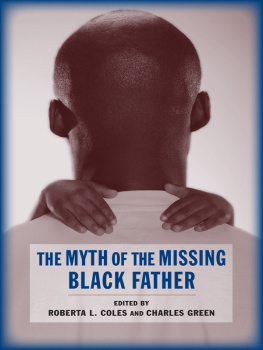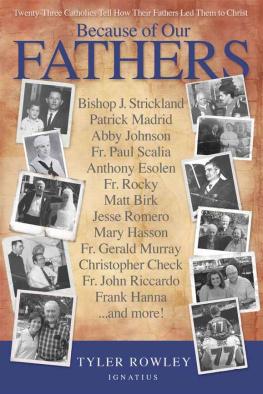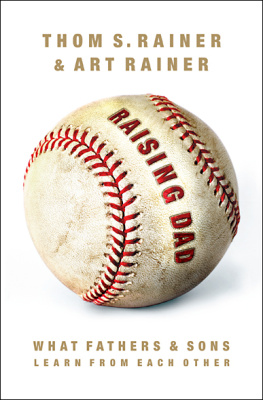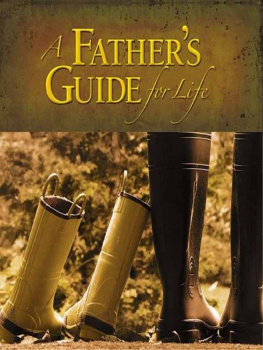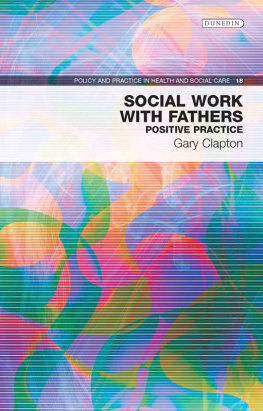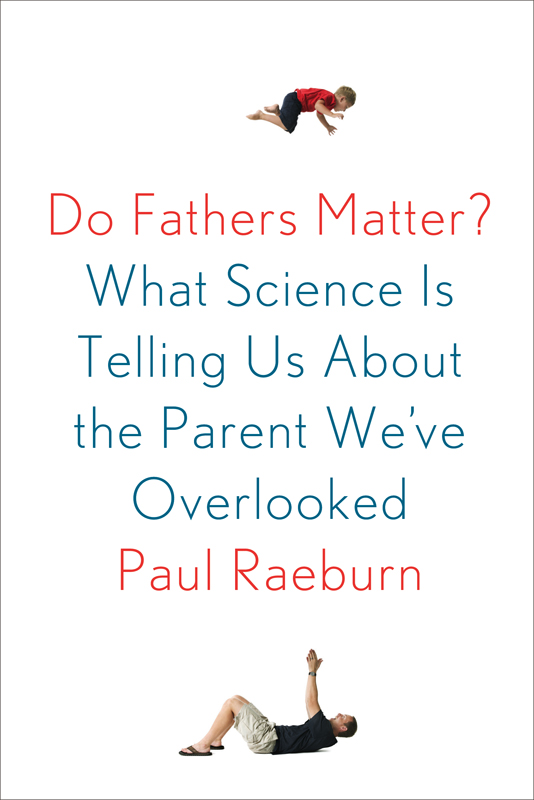Contents
Guide

The author and publisher have provided this e-book to you for your personal use only. You may not make this e-book publicly available in any way. Copyright infringement is against the law. If you believe the copy of this e-book you are reading infringes on the authors copyright, please notify the publisher at: us.macmillanusa.com/piracy.
To my father and mother,
who have made a very impressive team
And to Elizabeth and all the children
My fathers eyes had closed upon the light of this world six months, when mine opened on it. There is something strange to me, even now, in the reflection that he never saw me
Charles Dickens, David Copperfield
Contents
Introduction: Cleaning Out the Attic
I got interested in fatherhood in the usual way: I had children. In the 1980s, I had three children by my first marriagetwo boys and a girl, who are now grown and prospering. A decade ago I remarried, and my wife Elizabeth and I have since had two boys. When Elizabeth and I had the boys, friends asked whether being a father was different the second time around. I lied. Well, sure, Ive made all the mistakes, I would say. This time I can get it right. My older children were inclined to agree with the first proposition, but were dubious about the second.
The truth was, I felt no more prepared the second time than I had been the first time. And it didnt take long to figure out that parenting, for me, was still a hit-and-miss affair. I watched myself once again making mistakessometimes the same mistakes Id made before.
The first time around, Id operated mainly on instinct, confident that love and attention would go far. One of my editors at the time, a coarse newspaperman with tangled white hair, a rumpled suit, and a carelessly knotted tie who favored three-martini lunches, told me that the most important things to do were to tell kids you love them and to spend time with them. And thats what I did. It wasnt bad advice, but I came to realize that it wasnt nearly enough.
The second time around, I had more questions. What is it, exactly, that fathers do for their children? How much do fathers matter? And what in turn do children do for their fathers? These are questions for which many people, including my former editor, think they have the answer. Many of our parents think they have this figured out and are only too happy to point out our mistakes as we begin to raise our own families. Teachers, friends, fellow employees all know what we should be doing with our children, and many of them are eager to let us know, whether or not weve asked for advice. If you live in New York City, as I do, strangers on the street wont hesitate to tell you that you shouldnt be out with your baby in this weather, or that you should have brought an umbrella so the baby doesnt catch a cold. (The link between using an umbrella and catching a cold is a scientific question Ill leave for another book.)
We see this not only in friends and acquaintances but also in celebrities and popular culture. When Alex Rodriguez of the New York Yankees was suspended for using illicit drugs to boost performance, he blamed his fall on his fathers desertion. The event that makes him so remote, so rudderless, took place when he was 9, when his father disappeared, George Vecsey wrote in The New York Times . This is not pop psychology to explain a man who blundered into the airplane propeller of adult reality. This is his own theory.
* * *
Of course it is pop psychology, and it doesnt do any more to enlighten us than our well-intentioned friends and family. As is the case with many of us, Rodriguez thinks he knows how his fathers absence affected him and why it might have influenced him to use illegal performance-enhancing drugs, threatening his baseball career. But while hes entitled to his opinion, he cant really know whether any of that is true. Many of us have ideas about how our fathers might have helped or hurt us growing up, but even Rodriguez cant be sure hes right. Thats one of the things I hope to correct with this book. As a science reporter, Im professionally interested in what we know to be true, not what we think we know. Much of my work as a journalist has had a single aim: to replace stereotypes and half-truths with what scientists have discovered to be true. When I plunged back into fatherhood for the second time, I thought it would be useful to apply that same rigor to our beliefs about fathers. The more I began to question what I knew, the more I found to question. Is infant bonding limited to mothers? Do fathers contribute to their kids language development? How do fathers affect childrens performance in school? Do they have any influence over their teenage children? And do older fathers, as weve seen in the news, pose a risk to their children?
Much of what we think we know about these things is based on misconceptions. Its long past time to clean out the attic, get rid of these myths, and take a good look at what researchers are learning about fathers and their children and families. The short answer is that fathers are vastly important in their childrens lives, in ways that both scholars and parenting experts have overlooked.
For a long time, until women began entering the workforce in bigger numbers in the 1960s and 1970s, fathers had a valuableand often overlookedrole to play in the family. They brought home the paychecks that housed and fed their families and provided a little extra for dance lessons, Little League uniforms, and bicycles for the kids. And while bringing home a paycheck might not seem like the most nurturing thing a parent could do, it was vitally important: nothing is more devastating to the lives of children than poverty. Keeping children fed, housed, and out of poverty was significant.
But was that it? What else could fathers claim to contribute to their children?
As recently as a generation ago, in the 1970s, most psychologists and other experts had an easy answer to that question: not much. With regard to infants, especially, fathers were thought to have little or no role to play. In 1976, Michael E. Lamb, a developmental psychologist and pioneer in research on fathers, wrote that the emphasis on mothers in infants development was so one-sided that it seemed as if the father is an almost irrelevant entity in the infants social world. For decades, psychologists had assumed that the mother-infant relationship is unique and vastly more important than any contemporaneous, or indeed any subsequent, relationships. The attachment to this nurturing and protective adult was supposed to give the infant an evolutionary advantageeven Darwin had endorsed this exclusive focus on the mother, the experts claimed, and who was going to argue with Darwin?
There wasnt much evidence for the irrelevancy of fathers. But there wasnt a lot of data to suggest they were relevant, either. Few had asked the question, and nobody knew the answer. The irrelevancy of fathers had become an article of faith among researchers, and why would any of them question something they knew to be true?
Lamb was among the first to start challenging this assumption. Studies were just appearing that suggested that the bond between mothers and infants wasnt nearly as strong as others had assumed, and that the amount of time mothers and infants spent together wasnt a good predictor of the quality of their relationship. Finally, a few researchers who had dared to look elsewhere were finding that the interaction that at least some infants have with their fathers is enjoyable and marked by highly positive emotions on both sides. This insight was beginning to appear in professional journals only a few years before my oldest son was born, at which time I could have easily persuaded the professionals that, yes, some infants have fun with their fathers, and yes, you will find that highly positive emotions are involved.


